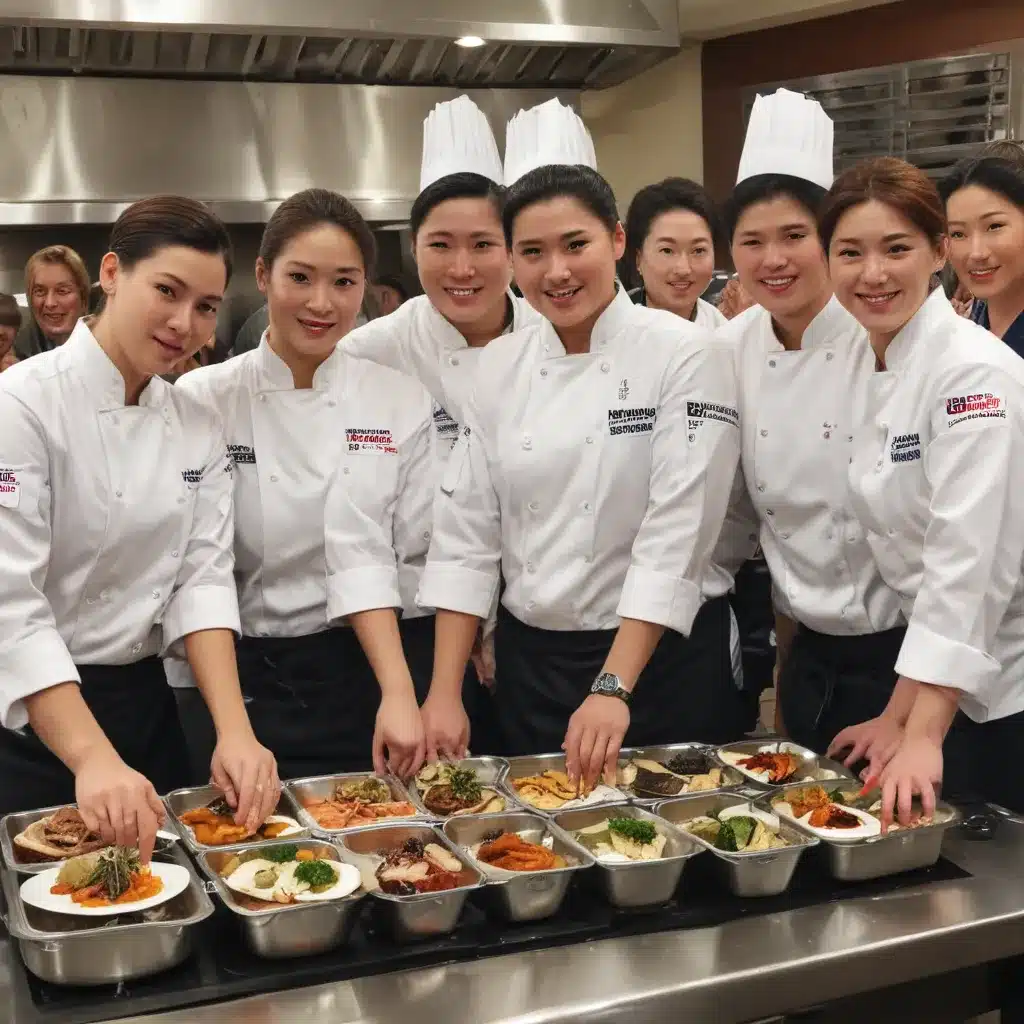
The Culinary Collision of East and West
As I step into the bustling kitchen of the Boston Culinary Institute, the air is thick with the tantalizing aroma of sizzling beef and the rhythmic clatter of chopping knives. Today, the city’s top chefs are going head-to-head in a high-stakes competition to showcase their mastery of Korean cuisine. It’s a battle of culinary prowess, where the boundaries between East and West blur, and the future of Boston’s gastronomic landscape hangs in the balance.
I can’t help but feel a thrilling sense of anticipation as I weave through the organized chaos, observing the chefs in their element. Each one is a maestro, commanding their station with the poise and precision of a seasoned virtuoso. But this is no ordinary symphony – it’s a culinary symphony, where the harmonious interplay of flavors and textures is the ultimate goal.
The Chefs: Pioneers of Fusion Cuisine
To my left, I spot Chef Lena Park, a rising star in the local food scene, her brow furrowed in concentration as she delicately plates a dish of bulgogi-style short ribs. Across the room, Chef Aidan Thompson, known for his avant-garde approach to fine dining, is meticulously layering kimchi and scallion pancakes, his eyes alight with a spark of culinary inspiration.
These chefs are not just cooking – they’re redefining the boundaries of Korean cuisine, blending traditional techniques with modern sensibilities to create a unique culinary fusion that has the food critics and foodies of Boston abuzz with excitement. “I want to show that Korean food is so much more than just barbecue and bibimbap,” Chef Park confides, her voice barely audible over the sizzle of the woks. “There’s a depth and complexity to these flavors that I’m determined to explore.”
The Judges: Guardians of Authenticity
Overseeing the competition are a panel of esteemed judges, each one a revered expert in the realm of Korean cuisine. Among them is Michelin-starred chef Junsu Lee, who has made a name for himself by championing the preservation of traditional Korean flavors. “It’s not just about the technicality of the cooking,” he explains, his gaze sweeping over the bustling kitchen. “We’re looking for chefs who can capture the essence of Korean food – the delicate balance of sweet, sour, and umami that has been honed over centuries.”
Beside him sits Soo-jin Kim, a renowned food writer and self-proclaimed “kimchi connoisseur.” With a discerning palate and an encyclopedic knowledge of Korean culinary history, she is charged with ensuring that the dishes presented today maintain a reverence for their roots, even as they push the boundaries of innovation.
The Challenges: Bridging the Cultural Divide
As the competition progresses, the chefs are faced with a series of increasingly complex challenges that test the limits of their creativity and cultural understanding. One task requires them to reinvent a classic Korean street food, transforming the humble tteokbokki into a sophisticated, fine-dining-worthy dish. Another challenge tasks them with incorporating traditional Korean fermentation techniques into a modern, Western-inspired dessert.
The tension in the room is palpable as the chefs navigate these culinary minefields, each one striving to strike the perfect balance between authenticity and innovation. “It’s not enough to simply replicate the flavors,” Chef Thompson explains, his brow glistening with the effort of his work. “We have to understand the cultural context, the history and the emotional resonance of these dishes. That’s what will truly set our creations apart.”
The Verdict: Celebrating Culinary Fusion
As the final dishes are plated and presented, the judges fall silent, their eyes narrowed in deep contemplation. I find myself holding my breath, anticipating the verdict that will determine the future of Korean cuisine in Boston.
After what feels like an eternity, Junsu Lee rises from his seat, his expression unreadable. “These chefs have shown us that the boundaries between East and West are not as rigid as we once thought,” he announces, his voice commanding the attention of the room. “They have taken the flavors and techniques of Korea and woven them into something truly remarkable – a culinary fusion that celebrates the richness of both cultures.”
The room erupts in thunderous applause as the winners are revealed, their dishes hailed as masterpieces of modern gastronomy. It’s a triumph not just for the chefs, but for the entire city of Boston, which has proven itself to be a dynamic and welcoming hub for the exploration of global cuisines.
The Future: Embracing Culinary Diversity
As I make my way through the bustling streets of Boston, the echoes of the competition still ringing in my ears, I can’t help but feel a sense of excitement for the future of the city’s culinary landscape. Korean cuisine, once relegated to the fringes, has now taken center stage, inspiring a new generation of chefs to push the boundaries of what’s possible.
At Korean Garden Boston, we’re proud to be a part of this culinary revolution, offering our guests a taste of authentic Korean flavors and techniques, as well as a glimpse into the dynamic fusion that is redefining the city’s food scene. Whether you’re a seasoned connoisseur or a curious newcomer, we invite you to join us on this delicious journey of discovery, where the traditions of the East and the innovation of the West converge in a symphony of unforgettable flavors.
